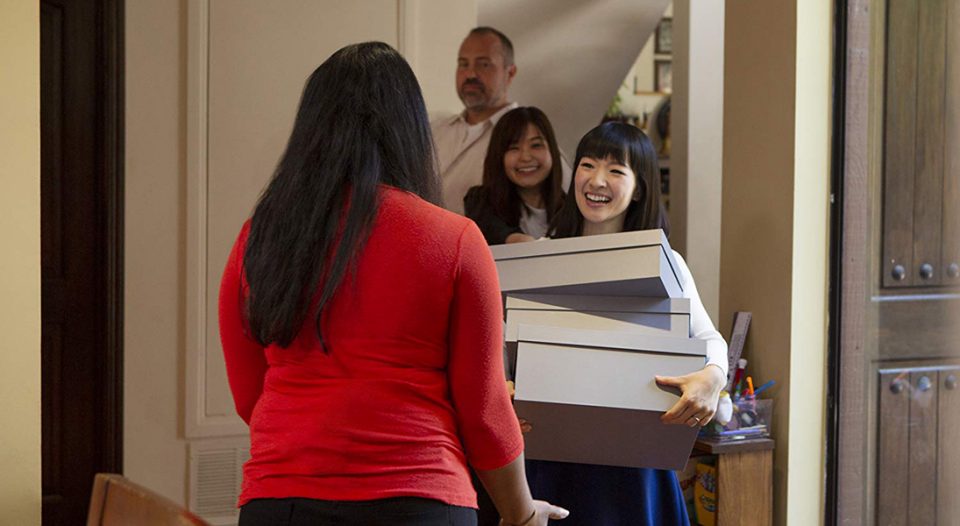I first learned of Marie Kondo from my husband. At the time, we were relocating from one apartment to another before closing on our first home. Packing put Jay and me face to face with the obscene amount of stuff we had accumulated over five years of city living. Kondo’s book The Life-Changing Magic of Tidying Up promised something almost too good to be true: if we simply discarded items that didn’t spark joy, we’d be happy. We applied the “KonMari” method to our possessions and came up with half a dozen bags for Goodwill.
Did it work? Sort of. We moved into our new house with a lighter load than before. And yes, we felt relieved, even joyful. Two years later, our home is filled with laughter, love and, well, boatloads more stuff—we have a toddler now.
So when my husband texted me about the new Netflix series Tidying Up With Marie Kondo, I knew I had to see it. Exhausted from a long workday and a trying evening with our son, I flopped into bed alongside Jay and flipped on the TV. My heart lurched—on-screen was a couple whose life mirrored ours. As Rachel Friend described her difficulties juggling childcare and housework (episode one), I fought back tears. I gasped at their mountains of clothing and cheered as Kondo taught the couple her patented tidying tricks. One episode in, I was hooked.
What I loved most about the show wasn’t the magical home and life make-overs that transpired from tidying up. I was fascinated with Kondo herself. With her perfect hair, kind demeanor and flawless white blouses, she personified grace. Tidying Up, which has sparked a nationwide decluttering craze and think pieces galore on women’s emotional labor, should have kick-started my next cleaning spree. Instead, I couldn’t stop pondering what it might be asserting about the human condition and our need for a savior.
Tidying Up isn’t the first show to highlight American materialism (see Hoarders and Clean Sweep). Yet unlike its predecessors, Tidying Up stresses the sacredness of the objects we own. In episode eight, when Alishia Holmes-Watson is trying to declutter her home, the project is stalled by a well-worn black dress sparking memories of a beloved grandmother. Holmes-Watson holds the dress to her chest, grieving, and Kondo gently coaches her to take her time. She encourages all her clients to sort and store their items carefully, thanking possessions they wish to relinquish for their service. When kids and adults alike bid farewell to old items by giving thanks, it looks like prayer.
Unfortunately, we cannot KonMari our way to redemption.
Kondo’s philosophy of possessions, rooted in the Japanese religion Shinto, challenges American culture but parallels Lutheran thought on care for creation. Lutherans believe that every item we own really belongs to God and, therefore, is a blessed gift. From the Garden of Eden to today, God has tasked us with the great responsibility to steward God’s creation. Kondo too stresses an ethic of environmental stewardship. In Tidying Up, items that end up in garbage bags are carefully donated to a chosen charity shop to become another person’s treasure. Any discomfort we feel watching Tidying Up may spring from our collective carelessness in accumulating goods and our failure to steward such blessings.
Conversely, Kondo is unafraid, actually gleeful, to confront the mess hiding in our overstuffed closets and our hearts—perhaps because she knows what’s on the other side of cleaning up. In episode three, Katrina Mersier breaks down in tears of frustration because she hasn’t better equipped her children to live in a tidy fashion. The oppressive weight of clearing clutter and teaching cleanliness shouldn’t fall squarely on Mersier’s shoulders; her husband bears responsibility too. Kondo’s teachings lift some of the burden from Mersier and encourage a team approach to tidying. After the family spend weeks sorting through their belongings—yes, even the kids get involved—Mersier feels freed and redeemed, and everyone vows to do better.
We gravitate to Kondo because she has an irresistible message: if you follow my instruction, you can find new life. Tidying Up illuminates our insatiable hunger for someone who will save us from our messiness. Perfectly folded fitted sheets and neatly organized closets and bookshelves promise to transform us. What’s not to love about that story?
Unfortunately, we cannot KonMari our way to redemption. No matter how many times we declutter our homes, inevitably, mess returns. Similarly, no matter how many times we repent at the communion table, we are bound to sin again. Created in God’s image, we are restless until we find rest in God, St. Augustine wrote in Confessions. So often we look to self-help books and life coaches and gurus for rescue. “Help me out of this mess!” we cry, ashamed of our unfortunate condition.
Here’s the good news: There is nothing we can do to save ourselves. God sent Jesus to earth to save us from our sin. “For by grace you have been saved through faith, and this is not your own doing; it is the gift of God—not the result of works” (Ephesians 2:8-9). The most beautiful thing about the salvation Jesus offers is precisely that we cannot earn it.
Jesus loves you right now, as you are, in your mess. Jesus gives you a fresh start every time you commune. No need for garbage bags, adorable little boxes or personal organizers. Just pure, simple grace.





